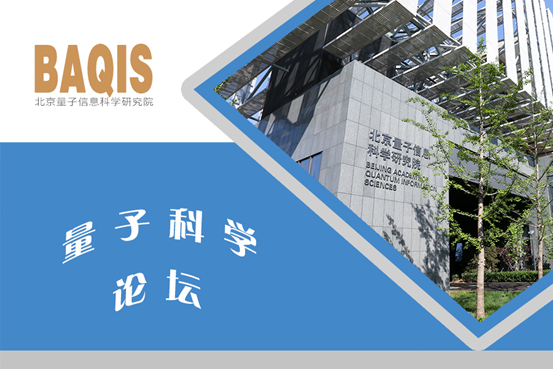BAQIS Quantum Science Forum 88: Novel spin-orbit torque in two-dimensional ferromagnets and antiferromagnets
2023/06/06

Date and Time: 6-June-2023 10am
Speaker: Prof. Fei Xue, University of Alabama at Birmingham, USA
Host: Ming Lu, BAQIS
Title: Novel spin-orbit torque in two-dimensional ferromagnets and antiferromagnets
Abstract:
Spintronics studies the interplay between electron charge and spin degrees of freedom. An archetypal application is magnetic random access memory, in which electric current switches the magnetization between two bi-stable states (representing “0” and “1”). With the rapid commercialization of these devices, research has switched to other ways to use electricity to control the magnetization. One focus has been on the spin Hall effect, in which spin-orbit coupling in a nonmagnetic metal enables spin currents flowing transverse to applied electric fields. This spin current can exert a torque and switch the magnetization, so called spin-orbit torque. Spin-orbit torque has great potential to expand the range of spintronics applications for magnetic memory and neuromorphic computing.
One property of spin-orbit torques that is important for many applications is the ability to deterministically switch magnets with perpendicular anisotropy. In this talk, I will show how hidden material properties, like crystal symmetry, can efficiently provide such behavior using two-dimensional semimetals. I will present our findings that when local site symmetry is lower than the global symmetry, electric fields can generate unconventional spin currents. Although this unconventional spin current is hidden in bulk properties, it can exert an unconventional torque in adjacent ferromagnets and switch the perpendicular magnetization.
Another forefront research area is using antiferromagnetic materials in spintronic devices. I consider the spin-orbit torque in collinear antiferromagnets with staggered magnetizations on two sublattices. Using the two-dimensional antiferromagnet CrI3 as an example, I show that current-induced staggered spin-orbit torques can switch the antiferromagnetic Neel order and drive sub-terahertz magnetic oscillations by simply changing the electric-field strength.
[1] F. Xue, P. M. Haney, “Intrinsic staggered spin-orbit torque for the electrical control of antiferromagnets: Application to CrI3”, Physical Review B 104, 224414 (2021).
[2] F. Xue, P. M. Haney, “Staggered spin Hall conductivity”, Physical Review B 102, 195146 (2020).
[3] F. Xue, C. Rohmann, J. Li, V. P. Amin, P. M. Haney, “Unconventional spin-orbit torque in transition metal dichalcogenide/ferromagnet bilayers from first-principles calculations”, Physical Review B 102, 014401 (2020).
[4] F. Xue, M. D. Stiles, P. M. Haney, “Spin-orbit torque in monolayer Fe3GeTe2”, manuscript in preparation.
About the Speaker:
Dr. Fei Xue obtained his BS from Nanjing University in China in 2012 and PhD in condensed matter theory from the University of Texas at Austin in 2018. He then became a joint postdoctoral research at NIST and University of Maryland. He joined University of Alabama at Birmingham as an assistant professor in Department of Physics in 2021. His research interests include Interaction-induced exotic phases and collective excitations in novel quantum phases of matter, and quantum transport phenomena due to spin-orbit coupling from first-principles calculation.
 中文
中文 Email
Email QCloud
QCloud Log in
Log in
